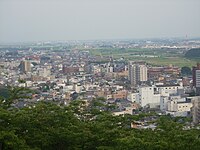Ashikaga, Tochigi
Geography
Ashikaga is located in the northern Kanto plain in the far southwestern corner of Tochigi Prefecture, bordering on Gunma Prefecture to the north, west and south. The Watarase River flows through the center of the city. It is located approximately 80 km north of Tokyo.
Surrounding municipalities
Climate
Ashikaga has a Humid continental climate (Köppen Cfa) characterized by warm summers. The average annual temperature in Ashikaga is 14.2 °C. The average annual rainfall is 1280 mm with September as the wettest month. The temperatures are highest on average in August, at around 26.4 °C, and lowest in January, at around 2.9 °C.
Demographics
Per Japanese census data, the population of Ashikaga has declined over the past 30 years.
| Year | Pop. | ±% |
|---|---|---|
| 1960 | 146,209 | — |
| 1970 | 156,004 | +6.7% |
| 1980 | 165,756 | +6.3% |
| 1990 | 167,686 | +1.2% |
| 2000 | 163,140 | −2.7% |
| 2010 | 154,462 | −5.3% |
| 2020 | 144,746 | −6.3% |
History

During the Heian Period, Ashikaga was developed by Minamoto no Yoshikuni, whose descendants later became the Ashikaga clan. The area was noted from this period for its academy, the Ashikaga Gakkō. During the Edo period, it was the center of Ashikaga Domain under the Tokugawa shogunate. Following the Meiji restoration, the town of Ashikaga within Ashikaga District, Tochigi was established with the creation of the modern municipalities system on April 1, 1889. It was elevated to city status on January 1, 1921. Ashikaga annexed the neighboring village of Keno on March 3, 1951, and the town of Yamabe on April 1, 1953. This was followed on August 1, 1954, by the villages of Mie and Yamamae, and on November 1, 1954, by the villages of Kitago and Nagusa. On April 1, 1959, Ashikaga annexed the village of Tomita, and the northern half of the village of Yabagawa on July 1, 1960. On October 1, 1962, Ashikaga annexed the towns of Mikuriya and Sakanishi. Ashikaga District was dissolved by this final merger.
Government
Ashikaga has a mayor-council form of government with a directly elected mayor and a unicameral city legislature of 24 members. Ashikaga contributes four members to the Tochigi Prefectural Assembly. In terms of national politics, the city is part of Tochigi 5th district of the lower house of the Diet of Japan.
Economy
Ashikaga has long been noted for its textile industry, but in recent years, it has also become known as an industrial and commercial city producing various aluminum, machine metal works and products. In the agricultural sector, Ashikaga is noted for its tomatoes.
Education
- Ashikaga Institute of Technology
- Ashikaga Junior College
- Ashikaga has 22 public primary schools and 11 public middle schools operated by the city government and five public high schools operated by the Tochigi Prefectural Board of Education. There are also three private high schools and one private middle school. The prefecture also operates two special education schools for the handicapped.
Transportation
Railway
- Tomita - Ashikaga Flower Park - Ashikaga - Yamamae - Omata
![]() Tōbu Railway – Tobu Isesaki Line
Tōbu Railway – Tobu Isesaki Line
- Agata - Fukui - Tōbu-Izumi - Ashikagashi - Yashū-Yamabe
Highway
 Kita-Kantō Expressway – Ashikaga Interchange – Izuruhara Parking Area
Kita-Kantō Expressway – Ashikaga Interchange – Izuruhara Parking Area National Route 50
National Route 50 National Route 293
National Route 293 National Route 407
National Route 407
Local attractions




- Ashikaga Gakkō (足利学校): referred to as the oldest school in Japan.
- Ashikaga Flower Park (足利フラワーパーク): Japan's oldest and largest wisteria.
- Banna-ji Temple (鑁阿寺): A temple known for its association with the Ashikaga clan.
- Coco Farm & Winery, located in the foothills on the outskirts of town. Founded around 1950, the vineyards are tended by adults with special needs and staff members living in community. During the third weekend of November, a harvest festival is held with live music and wine tasting. Thousands of visitors attend every year.
- Kurita Museum (栗田美術館): This museum has a fine collection of Imari and Nabeshima porcelains.
- Orihime Shrine (織姫神社): This shrine was built in 1879, the guardians of the textile city, Ashikaga.
- Watarasebashi Monument: A stele erected near Watarase Bridge in 2007 in honor of Chisato Moritaka's 1993 song "Watarasebashi". The stele features a speaker that plays the song.
- Watarase River Fireworks display, which takes places on the first Saturday of August attracts thousands of people from around the Kantō area.
Sister cities
 Jining, Shandong, China
Jining, Shandong, China Kamakura, Japan
Kamakura, Japan Springfield, Illinois, United States
Springfield, Illinois, United States
Notable people
- Atsushi Abe, voice actor
- Mitsuo Aida, poet and calligrapher
- George Akiyama, manga artist
- Yumiko Hara, marathon runner
- Chiaki Ishii, Japanese Brazilian judoka
- Toshimitsu Motegi, politician, member of parliament and Japanese government minister
- Noriyo Tateno, professional wrestler
- Masao Urino, songwriter, director
See also
- Asteroid 9887 Ashikaga, named after the city
References
- ^ "Ashikaga CIty official statistics" (in Japanese). Japan.
- ^ Ashikaga climate data
- ^ Ashikaga population statistics
- ^ "Eight of the World's most amazing trees from the major oak to the lone cypress". The Guardian. 6 October 2023. Retrieved 7 October 2023.
- ^ "森高千里 『渡良瀬橋』MVの高画質映像を発掘公開". News Post Seven. 2017-07-14. Retrieved 2020-04-06.
- ^ [1] Archived 2016-03-06 at the Wayback Machine Ashikaga City official home page
External links
![]() Media related to Ashikaga, Tochigi at Wikimedia Commons
Media related to Ashikaga, Tochigi at Wikimedia Commons
- Official Website (in Japanese)
 Ashikaga travel guide from Wikivoyage
Ashikaga travel guide from Wikivoyage
